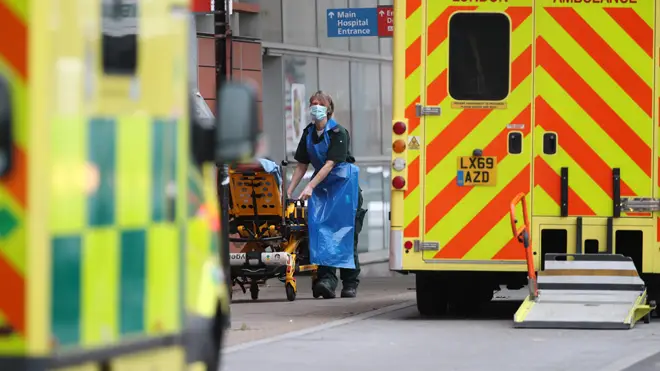
Ben Kentish 10pm - 1am
23 January 2021, 06:53 | Updated: 23 January 2021, 07:14

Scientists have warned there can be no early easing of lockdown rules because of the new variant of Covid-19.
Boris Johnson has warned the strain first identified in south-east England may be associated with "a higher degree of mortality".
Scientists on the New and Emerging Respiratory Virus Threats Advisory Group (Nervtag), subcommittee concluded there was a "realistic possibility" that the variant resulted in an increased risk of death, leading to the Prime Minister's announcement at yesterday's press conference.
However some scientists have called for more data, suggesting that No10 could have waited up to another two weeks before making the announcement, with even Sir Patrick Vallance saying the numbers are "very uncertain".
Ministers are toughening their lockdown messaging, including a series of hard-hitting new adverts highlighting the pressure on the NHS.
The Prime Minister said the Government could have to bring in further restrictions on travel following a warning that other new variants found in South Africa and Brazil may be more resistant to the vaccines that have been developed.
Meanwhile, the British Medical Association has reportedly written to chief medical officer for England Professor Chris Whitty calling for the gap between doses of the Pfizer/BioNTech vaccine to be reduced to six weeks.

New variant of Covid may be more deadly than original virus
Nursing leaders are also calling for the use of higher-grade protection against new variants of Covid-19.
The Royal College of Nursing wants a review of the use of standard face masks, saying guidelines differ between NHS trusts creating a "postcode lottery" for staff.
READ MORE: 'Some evidence' UK Covid variant more deadly than original virus, PM says
READ MORE: Prof Whitty defends second vaccine dose delay
At a No 10 news briefing on Friday, the Government's chief scientific adviser Sir Patrick Vallance said early evidence suggested the new UK variant could increase mortality by almost a third in men in their 60s.
His warning followed a briefing by scientists on the Government's New and Emerging Respiratory Virus Threats Advisory Group (Nervtag) which concluded there was a "realistic possibility" that it was associated with an increased risk of death.
It was already known that the new variant was up to 70% more transmissible than the original - leading to a tightening of restrictions across the UK from late December onwards.
Rowland Kao, professor of veterinary epidemiology and data science at the University of Edinburgh, said the latest findings suggested it was responsible for the "unexpectedly high" numbers of hospital admissions, especially around London.
"While the recent results showing declining case numbers is good news, and suggest that the variant is controllable via existing measures, these results on deaths imply that burden in hospitals will continue to be high requiring a more prolonged period of restrictions," he said.

Patrick Vallance outlines evidence showing new variant is more deadly
Mr Johnson said the case numbers remained "forbiddingly high" and that it would be a mistake to unlock in England if it were to lead to "another big rebound" in the disease.
Friday saw a further 1,401 deaths across the UK of people who had tested for Covid-19 in the previous 28 days, however there was some good news with evidence the various lockdown measures in place across the country were having an effect.
A sub-group of Sage said the reproduction number, the R, for coronavirus had fallen to below one across the UK, suggesting a retreating epidemic.
The Scientific Pandemic Influenza Group on Modelling (Spi-M) put the R, which represents how many people an infected person will pass the virus on to, at 0.8 to 1.0, down from 1.2 to 1.3 the previous week.
It said the number of new infections was shrinking by between 1% and 4% every day.
However Prof Whitty said the situation across the UK remained "extremely precarious".
"A very small change and it could start taking off again from an extremely high base," he said.
"If that happened again, we would be in really, really deep trouble."